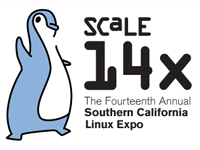红帽博客
 At first blush, the Southern California Linux Expo (SCaLE) and the Free and Open Source Software Developers' European Meeting (FOSDEM) would seem to be as far apart as the 5611 miles that separate them. Sure, they have some surface similarities--they are both in late January, many of the same projects are showcased at each event, and there is Linux everywhere.
At first blush, the Southern California Linux Expo (SCaLE) and the Free and Open Source Software Developers' European Meeting (FOSDEM) would seem to be as far apart as the 5611 miles that separate them. Sure, they have some surface similarities--they are both in late January, many of the same projects are showcased at each event, and there is Linux everywhere.
But look a bit past that and you will see two events that represent community within the free and open source ecosystem in sharply different ways.
Having attended both events this year, the primary difference that stands out to me is the focus of the events. While both have very small, organic, grass-root origins, SCaLE and FOSDEM have diverged in what they are trying to accomplish.
For SCaLE, the schedule of events tends to showcase that which is new and interesting in the open source community, with an eye towards reaching students as well as educators and business people who might have an interest in Linux and its ecosystem. Across the world in FOSDEM, where the audience is very much students, there is less focus on the new and flashy and more on the core fundamentals of what FLOSS is about.
To be clear, this is not to say that FOSDEM is all dullsville and SCaLE is totally flash and cash. There are certainly commercial interests at FOSDEM and there is a deep bench of knowledge being shared at SCaLE. But the focus of the respective events reflects what their audiences have come to learn and see.
FOSDEM attendees are knowledgeable about free and open source software and are coming to Brussels to teach what they know and learn more. Whereas SCaLE attendees seem to be more in the learning stage of working with FLOSS. It's a subtle difference, but it reflects an overall community that is not composed of people who want or need the same things.
This is a conversation that we have had a lot in the Open Source and Standards group. The kind of community my colleague Rich Bowen works with is different with whom the folks Mikey Ariel leads. Ceph and Gluster are both storage platforms, but Patrick McGarry and Amye Scavarda take different approaches to their respective communities.
There is no "right" community style, because there is really no "typical" FLOSS community member. Communication and transparency are key to any successful community, but there is no single type of content delivered to communities.
When working with any free and open source project, keep this in mind, and don't make prejudicial assumptions about a project, even if you have worked with other free and open source projects before. SCaLE and FOSDEM are in the same ecosystem, but they are not the same kind of event. And that's a good thing.
About the author
Brian Proffitt is Senior Manager, Community Outreach within Red Hat's Open Source Program Office, focusing on enablement, community metrics and foundation and trade organization relationships. Brian's experience with community management includes knowledge of community onboarding, community health and business alignment. Prior to joining Red Hat in 2013, he was a technology journalist with a focus on Linux and open source, and the author of 22 consumer technology books.

